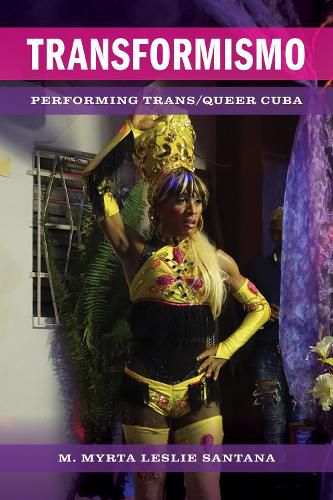Readings Newsletter
Become a Readings Member to make your shopping experience even easier.
Sign in or sign up for free!
You’re not far away from qualifying for FREE standard shipping within Australia
You’ve qualified for FREE standard shipping within Australia
The cart is loading…






In Transformismo, M. Myrta Leslie Santana draws on years of embedded research within Cuban trans/queer communities to analyze how transformistas, or drag performers, understand their roles in the social transformation of the island. Once banned and censored in Cuba, drag performance is now a state-sponsored event. Transformismo suggests that these performances make critical interventions in Cuban trans/queer life and politics and in doing so, the volume offers critical insight into how Cuba's postsocialist reform has exacerbated racial, sexual, and economic inequalities. Leslie Santana argues that mainstream trans/queer nightlife in Cuba is entangled with the island's tourism economy and has shaped the aesthetics and social makeup of transformismo in coastal Havana, which largely caters to foreigners. Leslie Santana considers how Black lesbian and transgender transformistas are expanding understandings of sexual selfhood and politics on the island, particularly questioning the ways that Black women's creativity is prominently featured in the aesthetics of tourism and trans/queer nightlife, while Black women themselves are denied social and material capital.
$9.00 standard shipping within Australia
FREE standard shipping within Australia for orders over $100.00
Express & International shipping calculated at checkout
In Transformismo, M. Myrta Leslie Santana draws on years of embedded research within Cuban trans/queer communities to analyze how transformistas, or drag performers, understand their roles in the social transformation of the island. Once banned and censored in Cuba, drag performance is now a state-sponsored event. Transformismo suggests that these performances make critical interventions in Cuban trans/queer life and politics and in doing so, the volume offers critical insight into how Cuba's postsocialist reform has exacerbated racial, sexual, and economic inequalities. Leslie Santana argues that mainstream trans/queer nightlife in Cuba is entangled with the island's tourism economy and has shaped the aesthetics and social makeup of transformismo in coastal Havana, which largely caters to foreigners. Leslie Santana considers how Black lesbian and transgender transformistas are expanding understandings of sexual selfhood and politics on the island, particularly questioning the ways that Black women's creativity is prominently featured in the aesthetics of tourism and trans/queer nightlife, while Black women themselves are denied social and material capital.